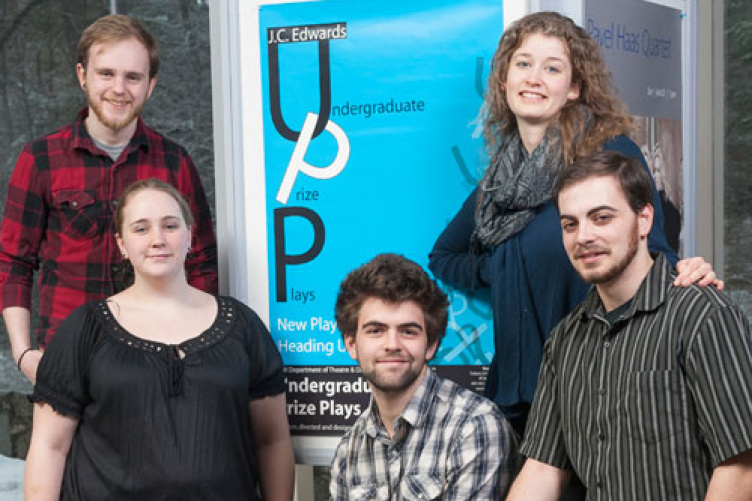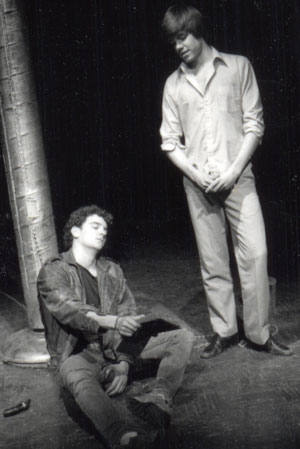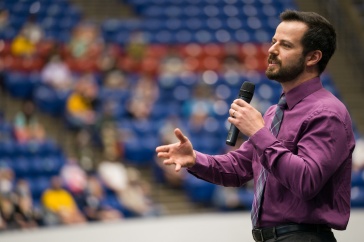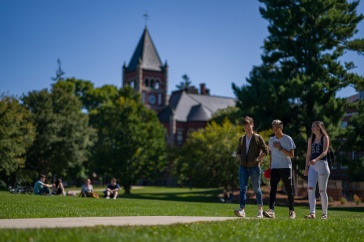
From left: Dan Shine, Alyssa LeBlanc, Colton Huelle, Elise Williams and Nicholas Iannotti.
Dozens of students have taken over the Hennessy Theatre. Faculty are not allowed. Only a few days remain before opening night of a major Department of Theatre and Dance production. No matter what happens, they and only they are responsible. For the first time in nearly two decades, students are producing the Undergraduate Prize Plays (UPPs), a department program in which students write, direct, perform, and design their own plays without faculty supervision.
The UPPs used to be a department institution. Running from the mid-’70s to mid-’90s, they provided generations of students valuable experience in independently creating theatre from blank page to final performance. But the program was discontinued in 1996 due to a lack of resources, a loss felt keenly by some who had experienced its benefits first-hand. One of those beneficiaries decided to do something about it. UPP alumnus Mike O’Malley ’88 hatched a plan with professor emeritus of theatre John Edwards, who approached department chair David Kaye, who pitched the plan to the department. It was a “go.” With O’Malley’s financial assistance, the department would re-instate the UPPs. 2013 marks the rebirth of the program, now renamed the John C. Edwards Undergraduate Prize Plays because, says O’Malley, “Professor Edwards was everything a great professor should be.”
For Kaye, one of the most exciting aspects of the new UPPs is that playwriting will now have a firm footing in the UNH theatre program. Though the UPPs support students in all aspects of production, the primary feature of the program is playwriting—students submit their original work for consideration and only the three best are chosen as “Prize Plays,” an honor that carries a cash component. In order to develop writing skills in students, O’Malley’s gift will ensure that a playwriting course is offered every year, something that just wasn’t possible previously. More frequent courses mean more plays will be written and more students will be accommodated across the University.
“The stature of the prize has really helped jumpstart student enthusiasm for writing for the stage,” notes Kaye. “It has been wonderful to see that the interest is not limited to students in our department. One of the winners this year is an English major. I am hoping that more students across all disciplines will soon be contributing plays for this event.”
Playwright and actor Mike O’Malley (of Yes, Dear and Glee), the generous donor behind the project, had his own plays produced in the UPPs during the mid ‘80s. He credits his ability to write his own material with getting him started in the industry, part of why he wanted to help with the development of those skills in others. But it is the independence required in UPP productions that seems the more important aspect of the experience for O’Malley. The control students have over every aspect of the production allows them to stretch creatively, he says.
|
Donor Mike O’Malley ’88 (left) performing in a 1986 Undergraduate Prize Play. |
“Students need to put what they’ve learned into action,” says O’Malley. “Oftentimes, they don’t know what they’re capable of until forced into a sink or swim experience.” He hopes the challenge will give students confidence and allow them to feel the deep camaraderie and sense of accomplishment he remembers feeling.
That accomplishment will surely be felt by this year’s winners as they see their plays come to life on the stage. The 2013 prize plays are “A Love Story,” written by Jessica Miller, a senior theatre and math education major from Lee, NH; “Occupational Hazards,” written by Dan Shine, a junior English and theatre double major from Shrewsbury, MA; and “Retreat to Will's House,” written by Colton Huelle, a junior English teaching major from Bedford, NH. Other prize winners are student designers Alyssa LeBlanc, a senior theatre major from Salem, NH; Sara Demos, a senior theatre major from York, ME; and Danielle Pancoast, a senior theatre major from Westford, MA.
Both the challenge and accomplishment of those involved in the UPPs this year may be more intense than in the past. That’s because the new UPPs are one of the five main stage productions of the Department of Theatre and Dance. The original UPPs were rehearsed during winter break and performed before the spring main stage productions went into rehearsal. But the new UPP profile is high—it’s been advertised widely and is part of a season subscription. That makes the stakes equally high. The choice was intentional, according to Kaye, who wanted this experience to differ from other student-run efforts such as theatre major capstone projects and Mask and Dagger, the student theatre group.
“The faculty wanted to give this collection of student-written and -produced plays as much stature as any of the plays or musicals that our faculty mount. We have clearly set the bar high for the student teams who are responsible for putting these new plays on our stage.”
|
The 2013 John C. Edwards Undergraduate Prize Plays will be performed from April 17-21 in the Hennessy Theatre at the Paul Creative Arts Center. Tickets are available at UNHarts.com. More information is available on the Department of Theatre and Dance website or by calling (603) 862-2919. |
The prominent position and high expectations reflect the importance that Kaye and his colleagues place on new work within the world of theatre, the development of which Kaye calls “one of the most critical elements of a bright future for the theatre.”
It’s a view that O’Malley and Edwards clearly share. Both are on the committee that chooses the winning plays, a commitment of time and energy that indicates the value they place on new work. O’Malley explains, simply, “I’m much more interested in new plays being performed than old plays being resurrected.”
Originally published by:
The College Letter, Newsletter of the College of Liberal Arts
-
Written By:
Staff writer | Communications and Public Affairs


















































